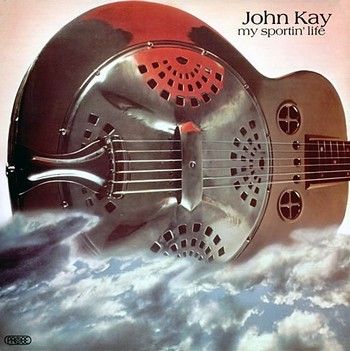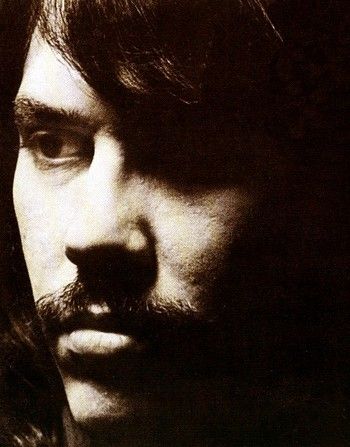
John Kay - My Sportin' Life - 1973 - ABC Dunhill/Probe
John Kay's second solo album is a short album but contains mostly good songs. There are three good John Kay compositions, "Nobody Lives Here Anymore", "My Sportin' Life", and "Dance to My Song". "Easy Evil" was written by Californian singer/songwriter Alan O'Day who composed great songs like "Angie Baby", Rock And Roll Heaven", and "Undercover Angel". "Drift Away" was composed by Mentor Williams (brother of Paul Williams) and originally recorded by John Henry Kurtz on his 1972 album Reunion. Dobie Gray's million selling 1973 Top 5 hit is probably the most popular version, but John Kay's great version here was recorded before Dobie Gray’s version was released. "Moonshine (Friend of Mine)" was composed by Canadian, Les Emmerson who with the Five Man Electric Band had five US hit singles between 1971 and 1974, including the million selling "Signs" in 1971. Kerry Chater who co-wrote "Heroes and Devils" was originally a member of Gary Puckett's Union Gap. "Sing With The Children" was composed by the late Ron Davies who also composed "It Ain't Easy" on Bowie's "Ziggy Stardust" album, the only non-Bowie track on that great album. The album also contains a rare Donald Becker & Walter Fagen (Steely Dan) tune, "Giles Of The River". John Kay has this to say about the album - "With the exception of “Sing With The Children”, the rest of the songs were recorded by studio musicians and myself. Mike Utley, keyboards, Russ Kunkel, drums, Danny Kortchmar, guitar and Lee Sklar, bass. With hindsight, I feel the album was perhaps, a little over produced and at times had a pop sound. Nevertheless this is still one of my favorite albums to this day. I’m particularly fond of my version of “Drift Away” as well as “My Sportin’ Life” “Nobody Lives Here Anymore” and “Dance To My Song”. Two other favorites of mine are “Sing With The Children” (double slide guitar work between Kent Henry and myself) and “Easy Evil” which has a great feel and Gloria Jones’ sexy harmony. People still comment on that song to this day". A really good album from John Kay in the country rock/folk style. [All tracks @ 320 Kbps: File size = 86.8 Mb]. Listen to John Kay's "Forgotten Songs & Unsung Heroes" album and also his great "Rock & Roll Rebels" compilation album.
TRACKS / COMPOSERS
1 Moonshine (Friend of Mine) - Les Emmerson
2 Nobody Lives Here Anymore - John Kay
3 Drift Away - Mentor Williams
4 Heroes and Devils - Renee Armand & Kerry Chater
5 My Sportin' Life - John Kay
6 Easy Evil - Alan O'Day
7 Giles of the River - Donald Fagen & Walter Becker
8 Dance to My Song - John Kay
9 Sing with the Children - Ron Davies
MUSICIANS
John Kay - Acoustic Guitar, Slide Guitar, 12-String Guitar, Dobro, Harmonica, Vocals
Kent Henry - Guitar, Slide Guitar
Danny Kortchmar - Guitar
Richard Podolor - Guitar, Mandolin, Electric Mandolin
Lee Sklar, Bill Cooper, George Biondo - Bass
Larry Knechtel - Piano, Organ
Mike Utley - Piano, Keyboards
Alan O'Day - Electric Piano
Hugh O'Sullivan - Organ, Vocals
Darryl Dragon - Electric Piano, Clavinet
Penti "Whitey" Glan - Drums
Russ Kunkel - Drums, Conga
Venetta Fields, Sherlie Matthews, Gloria Jones, Stan Farber, Gene Morford - Vocals

BIO
Steppenwolf leader/founder John Kay is perhaps the most overlooked early contributor to the musical style that would become heavy metal and hard rock. Kay was the first rocker to use the phrase heavy metal in a song, in one of metal's first great anthems: Steppenwolf's 1968 classic "Born to Be Wild." Born Joachim Fritz Krauledat on April 12, 1944, in the section of Germany that was once known as East Prussia, it was the American rock & roll that he heard on U.S. Armed Forces radio after his family moved to East Germany that fueled his interest in music. After relocating to Toronto, Canada, in 1958, Kay became even more transfixed by rock & roll -- leading to Kay picking up the guitar, writing songs, and playing in local bands. In the '60s, Kay founded the Sparrow, a rock outfit who played both Canada and the U.S., but received little attention. The group had fallen apart by 1967, but with a new, harder-edged style of rock beginning to conquer the charts and airwaves (Cream, Jimi Hendrix, and the Yardbirds), Kay decided to pursue this direction with his next band, Steppenwolf (titled after Hermann Hesse's novel of the same name). After moving to Los Angeles, the fledgling band was signed to Dunhill and recorded their self-titled debut, issued in 1968. The album became a sizeable hit, as "Born to Be Wild" was unleashed on an unsuspecting record-buying public, becoming one of rock's most instantly identifiable and enduring hits of all time. After the track was used in the 1969 cult classic movie Easy Rider, it subsequently appeared in countless other movies and TV commercials over the years and was covered by numerous other bands (Blue Oyster Cult, Slade, Crowded House, and the Cult). Steppenwolf continued to crank out hit albums (1968's The Second, 1969's At Your Birthday Party, and 1969's Monster), singles ("Magic Carpet Ride," "Rock Me"), and tours on a regular basis, with Kay being the only constant member among a revolving door of other musicians. By 1972, Kay decided to end the group, issuing his first solo albums around the same time: Forgotten Songs & Unsung Heroes and My Sportin' Life. Steppenwolf's retirement didn't last for long, however, as Kay alternated between the band and his solo career throughout the '70s, '80s, and '90s. He even took a few former members of the band to court when they, too, began touring behind the name Steppenwolf. In 1994, Kay penned an autobiography, Magic Carpet Ride, and four years later, Steppenwolf and Kay were the subject of an interesting Behind the Music episode for VH1. © Greg Prato © 2011 Rovi Corporation. All Rights Reserved http://www.allmusic.com/artist/john-kay-p13383/biography





2 comments:
LINK
p/w aoofc
ALTERNATE LINK
Post a Comment